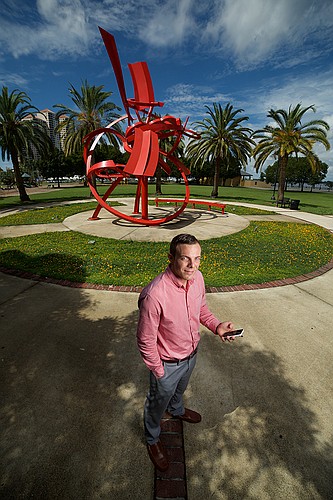- November 23, 2024
-
-
Loading

Loading

Jeffrey Shafer was in downtown Fort Myers watching a friend play in a quartet when inspiration for his companion Pokemon Go app, Poke Trainer, came about.
“I saw all these people walking around town and I wondered what they were doing,” says Shafer, “So I asked my friend and he said they were all playing Pokemon Go.”
Having little knowledge of the augmented reality game, Shafer kept investigating, asking questions until he stopped at monumental one: Can you chat and connect with people playing nearby? The answer was no.
“I started thinking there's got to be a way to make money on this,” says Shafer.
Armed with just enough knowledge of the game, the 28-year-old communications and marketing executive created a platform to connect people with a general interest to play the game and to enable people to meet others in their community who enjoy playing the game.
“It's no different than if you joined a softball league and wanted to make friends,” says Shafer, a Florida native. “It's a tool to connect people to do a particular activity.”
To vet his idea, Shafer used a Facebook page and accompanying ad as market research. The ad read: “Chat, meet and adventure with Pokemon Go trainers near you.”
After three days the page had a few hundred “likes.”
“Honestly, I don't think I could have gotten a better segment of people any other way than through social media like Facebook,” says Shafer, whose user demographic is 17- to 26-year-olds.
Shafer had experience building a few small business websites “on the fly,” but had no knowledge of how to create a smartphone app or — despite his marketing and public relations experience — how to promote it. In search of help and resources, he took his idea to an incubator company where he received positive feedback on the concept. He ultimately decided the incubator wasn't a viable option for his timeline or cash flow. He turned to a freelance contractor to help create the prototype.
It only took a month for prototype development, and after obtaining an Apple developer license, Poke Trainer — pronounced 'poke' not 'pok-ee' — went live as version 1.1 in late August. To date, the app has 2,500 users.
The app is in beta testing mode and is free. Shafer has no plans to change that. Also, a current user will not see in-app ads. However, once the app has reached Shafer's target number of 10,000 users, that could change.
So far, Shafer has used personal funding for his app creation, but as the concept expands, he'll seek private investors as well as incorporating a pool of sponsored businesses.
Currently, there are no specific locations for users to select, making it completely user-driven and open-ended. In future versions, business sponsors would pay a small fee and in return Poke Trainer would push or show those locations as nearby meet-up places potentially offering incentives to “trainers” who frequent those locations.
“Once they receive a certain amount of points they could redeem something at XYZ location,” says Shafer, who used free coffee as an example.
Shafer also considers the app a safety net for those playing, so people can meet up without facing a dangerous situation.
“I saw people were walking around by themselves in a city and potentially in unfamiliar areas,” he says.
Shafer believes his app is part of a bigger opportunity in the gaming world. And since a social app lives and dies on users, he wanted to justify the risk and time spent on Poke Trainer.
“That's when the idea of forming a business that is geared towards augmented reality social networking apps came into play,” says Shafer.